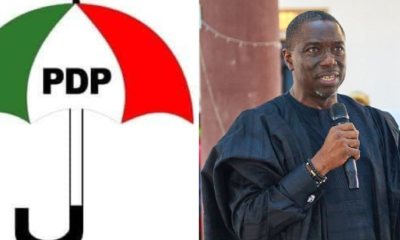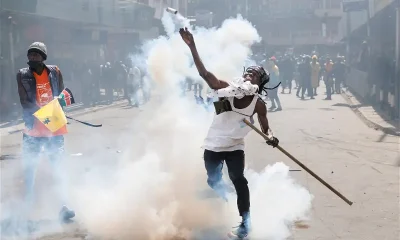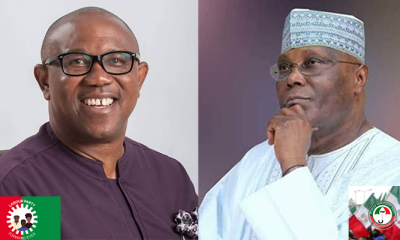
Foreign
Justin Trudeau Steps Down as Canada’s PM Amid Crisis

Justin Trudeau Resigns as Canada’s PM, Leaving a Leadership Vacuum Amidst Liberal Party Turmoil
Justin Trudeau, Canada’s charismatic yet controversial Prime Minister, announced his resignation on Monday, January 6, 2025, marking the conclusion of a transformative yet turbulent era in Canadian politics.
The announcement, delivered from Parliament Hill in Ottawa, comes amid plummeting approval ratings and escalating internal party tensions, setting the stage for an unprecedented leadership transition within the Liberal Party.
Standing before a packed press conference in Ottawa’s West Block, Trudeau, visibly composed but emotional, confirmed his intention to step down once the Liberal Party selects his successor through what he described as “a robust, nationwide competitive process.”

The decision follows months of political upheaval, most notably marked by the December 2024 departure of his trusted deputy, Chrystia Freeland, whose resignation dealt a significant blow to his administration’s credibility.
The timing of this announcement carries particular significance as Canada grapples with mounting economic challenges, including rising inflation rates, the housing affordability crisis, and strained international trade relations.
Justin Trudeau’s government has faced intense scrutiny over its handling of these issues, with recent polls showing Liberal Party support at its lowest point since 2015.
| RELATED NEWS: |
| Messi Snubs Biden’s Medal Of Freedom Ceremony Amidst Controversy |
| NNPCL Financial Scandal: Audit Reveals N514B Theft |
| Tesla Cybertruck Explosion: Soldier’s Final Act |
Economic Challenges
The resignation comes at a critical juncture for Canada’s economy, with the nation facing multiple challenges:
The housing crisis has intensified, with average home prices reaching unprecedented levels across major metropolitan areas.
Recent data from the Canadian Real Estate Association shows a 15% year-over-year increase in housing costs, putting homeownership further out of reach for many Canadians.

Inflation concerns persist, with the Consumer Price Index hovering at 4.8% as of December 2024, significantly above the Bank of Canada’s 2% target.
However, the government’s attempts to address cost-of-living issues through measures like the controversial Christmas tax holiday have faced criticism for being short-term solutions to long-term problems.
The announcement has catalyzed immediate speculation about potential successors to lead both the party and the nation. Several prominent figures have emerged as potential candidates:
Chrystia Freeland, despite her recent resignation, remains a strong contender, with her experience in finance and international relations positioning her as a formidable candidate.
Her departure letter, which criticized Trudeau’s focus on “political gimmicks,” has paradoxically strengthened her position as a potential leader who could chart a new course for the party.
Mark Carney, the former Governor of both the Bank of Canada and the Bank of England, has emerged as another leading contender.
His international experience and economic expertise could prove crucial in addressing Canada’s current challenges. Sources close to Carney indicate he is “seriously considering” entering the race.
François-Philippe Champagne, the current Minister of Innovation, Science, and Industry, has also been mentioned as a possible candidate, with his strong business background and Quebec roots potentially offering broad appeal.
Opposition Response
Conservative Party leader Pierre Poilievre has seized upon Trudeau’s resignation as an opportunity to challenge the Liberal Party’s legitimacy.
In a strongly worded statement posted on social media platform X, Poilievre emphasized that “every Liberal MP and Leadership contender supported EVERYTHING Trudeau did for 9 years,” suggesting that a mere change in leadership would not address fundamental policy concerns.
The New Democratic Party (NDP), which had previously supported Trudeau’s minority government through a confidence-and-supply agreement, has indicated a shift in its position.
Party leader Jagmeet Singh stated that the NDP would “carefully evaluate” its relationship with any new Liberal leader, potentially complicating the incoming prime minister’s ability to govern effectively.
Trudeau has confirmed receiving approval from Governor General Mary Simon to suspend parliamentary business until March 24, 2025.
This strategic move provides the Liberal Party with a crucial window to conduct its leadership race while maintaining governmental stability and preventing immediate opposition challenges through confidence votes.
The transition period will be closely monitored by constitutional experts, as it represents one of the most significant leadership changes in recent Canadian history.
The process must balance the need for thorough deliberation in selecting a new leader with the urgency of maintaining effective governance during a period of economic and political uncertainty.
International Implications
The leadership change comes at a crucial time for Canada’s international relations, particularly with its largest trading partner, the United States.
Ongoing negotiations regarding trade agreements, climate change commitments, and border security will likely face additional scrutiny during this transition period.
As Canada prepares for this historic transition, the implications extend far beyond the immediate political sphere.
The next Liberal leader will inherit not only the challenges that precipitated Trudeau’s resignation but also the responsibility of reuniting a fractured party and addressing the fundamental concerns of an increasingly skeptical electorate.




























